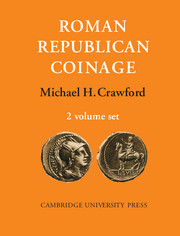Book contents
- Frontmatter
- Contents
- VOLUME I
- INTRODUCTION
- CATALOGUE
- VOLUME II
- misc-frontmatter
- 1 Technique and Technology
- 2 Weight Standards
- 3 Monetary Magistrates
- 4 Special Formulae
- 5 Administration and Control
- 6 Roman Units of Reckoning Under the Republic
- 7 Coinage and Finance
- 8 Careers of the Moneyers
- 9 Types and Legends
- 10 Art and Coinage
- Plates
- Indices
- Plate section
7 - Coinage and Finance
from VOLUME II
Published online by Cambridge University Press: 07 October 2011
- Frontmatter
- Contents
- VOLUME I
- INTRODUCTION
- CATALOGUE
- VOLUME II
- misc-frontmatter
- 1 Technique and Technology
- 2 Weight Standards
- 3 Monetary Magistrates
- 4 Special Formulae
- 5 Administration and Control
- 6 Roman Units of Reckoning Under the Republic
- 7 Coinage and Finance
- 8 Careers of the Moneyers
- 9 Types and Legends
- 10 Art and Coinage
- Plates
- Indices
- Plate section
Summary
Although it is probable that the aerarium kept detailed yearly accounts and that the Senate was responsible for drawing up at any rate an outline budget at the beginning of each year (see p. 617), the evidence from which to reconstruct either budget or accounts is not now available. All that can be done is to establish the approximate pattern of yearly income and expenditure, on the basis of scattered pieces of information about the revenues of the provinces, etc., and about major expenses, notably on the army.
Evidence may be drawn from two sources to check the picture built up in this way. There is in the first place occasional testimony concerning the contents of the aerarium or, more often, the absence of contents at a particular mcment; this testimony may be compared with the results achieved by adding up income and expenditure for the relevant periods of years. In the second place there is the coinage of the Roman Republic. Nothing suggests that this was ever issued for any other purpose than to provide the means for state expenditure. If this view is correct, it is reasonable to expect some correlation to exist between the amount of coinage and the volume of expenditure for a given year; the nature of the correlation will depend on whether payments were regularly made in new coin or not. The balance of probability is that down to Sulla they were made in new coin (see pp. 617-18) - the nature of the correlation which emerges provides the final confirmation.
A tolerably accurate picture of income and expenditure under the Republic is welcome; the aerarium, particularly in the late Republic, was at the centre of political controversy, with nobiles, Equites and populares all accused at one time or another of diverting the revenues of the Republic from their proper destination. Whoever it was who was responsible, the picture which can be built up of income and expenditure indicates clearly enough that someone was (see p. 695). Despite Cicero's plea for consideration towards the population of the Empire (de re p. iv, 7; cf. ii, 26), it is clear that much political argument in the late Republic was over the question of who should exploit the Empire, not over whether it should be exploited.
- Type
- Chapter
- Information
- Roman Republican Coinage , pp. 633 - 707Publisher: Cambridge University PressPrint publication year: 1975



